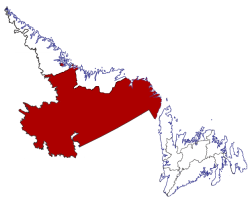Division No. 10, Newfoundland and Labrador
Appearance
(Redirected from Division No. 10, Subdivision D, Newfoundland and Labrador)
Division No. 10 | |
|---|---|
 Location of Division No. 10 in Newfoundland and Labrador | |
| Coordinates: 52°57′N 66°55′W / 52.950°N 66.917°W | |
| Country | Canada |
| Province | Newfoundland and Labrador |
| Area | |
| • Total | 199,703.36 km2 (77,105.90 sq mi) |
| As of 2016 | |
| Population (2016)[1] | |
| • Total | 24,639 |
| • Density | 0.12/km2 (0.32/sq mi) |
Census Division No. 10 of Newfoundland and Labrador is composed of the Labrador region of the province, excluding Nunatsiavut. It has a land area of 199,703 km² (77,105.8 sq mi) and at the 2016 census had a population of 24,639,[1] up from 24,111 in 2011.[2] Its two major population centres are the towns of Happy Valley-Goose Bay[3] and Labrador City.
Demographics
[edit]In the 2021 Census of Population conducted by Statistics Canada, Division No. 10 had a population of 24,332 living in 9,518 of its 10,941 total private dwellings, a change of -1.2% from its 2016 population of 24,639. With a land area of 191,691.09 km2 (74,012.34 sq mi), it had a population density of 0.1/km2 (0.3/sq mi) in 2021.[4]
| Ethnic Origin | Percentage of Population |
|---|---|
| Canadian | 41.8% |
| English | 30.4% |
| First Nations (North American Indian) | 15.8% |
| Inuit | 14.8% |
| Métis | 13.6% |
| Irish | 12.5% |
| Scottish | 7.1% |
| French | 6.4% |
| German | 1.8% |
| British Isles origins, not included elsewhere | 0.9% |
| Newfoundlander | 0.8% |
Towns
[edit]- Cartwright
- Charlottetown
- Forteau
- Happy Valley-Goose Bay
- Labrador City
- L'Anse-au-Clair
- L'Anse-au-Loup
- Mary's Harbour
- North West River
- Pinware
- Port Hope Simpson
- Red Bay
- St. Lewis
- Wabush
- West St. Modeste
Unorganized subdivisions
[edit]- Subdivision A (Includes: L'Anse-Amour, Capstan Island)
- Subdivision B (Includes: Lodge Bay, Paradise River, Black Tickle, Norman's Bay, Pinsent's Arm, William's Harbour)
- Subdivision C (Includes: Sheshatshiu, Mud Lake)
- Subdivision D (Includes: Churchill Falls)
- Subdivision E (Includes: Natuashish)
References
[edit]- ^ a b c "Census Profile, 2016 Census: Division No. 10, Census division [Census division], Newfoundland and Labrador". Statistics Canada. Retrieved October 13, 2019.
- ^ "Census Profile - Division No. 10, Census division". Statistics Canada. Archived from the original on 2 May 2014. Retrieved 2 March 2012.
- ^ "Happy Valley-Goose Bay, Newfoundland and Labrador (Town) Census Subdivision". Community Profiles. Statistics Canada.
- ^ "Population and dwelling counts: Canada and census divisions". Statistics Canada. February 9, 2022. Retrieved April 2, 2022.
- ^ "Census Profile, 2016 Census".
Sources
[edit]- "Division No. 10, Newfoundland and Labrador (Code 1010) Census Profile". 2011 census. Government of Canada - Statistics Canada.
